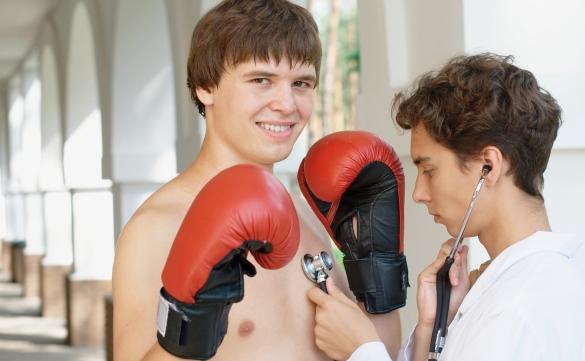Docs Cite Head Injuries in Ruling Out Youth Boxing

Children who box can suffer long-term damage or death from head injuries, especially concussions, so in a new policy statement, the American Academy of Pediatrics is saying the sport is not appropriate for children or teens.
Researchers from the AAP and the Canadian Paediatric Society reviewed the literature and found that a child's brain is more vulnerable to concussions than an adult's brain. Further, a child's brain can take longer to heal, and resulting memory impairment can make learning more difficult. The two groups published the paper today (Aug. 29) in the journal Pediatrics. The paper reinforces an earlier position from the AAP, and echoes concerns about boxing from groups such as the American Medical Association and the British Medical Association. While other sports such as football and ice hockey have higher injury rates in general, boxers "are actually rewarded for deliberate hits to the head and face," said study co-author Laura Purcell, a pediatric sport medicine physician at McMaster University in Hamilton, Ontario. "We needed to take a strong stand against boxing in youth athletes because of the risk of head injuries." Indeed, studies of amateur and professional boxers show that more than 70 percent of boxing injuries were to the head. Further, concussions accounted for one- third to one-half of injuries in amateur boxers, and 13 percent of matches ended because of concussions, Purcell said. Second impact syndrome Not only are children more susceptible to concussions, but repeated concussions also present the theoretical risk of a fatal condition called second impact syndrome, Purcell told MyHealthNewsDaily. If children suffer a second concussion "before they've recovered, they can develop fatal brain swelling," she said. "Part of the problem may be that children are unaware that they've had a head injury, and therefore can't take the appropriate steps to protect themselves." It's hard to argue against the authors' conclusions that brain trauma in children should be avoided, said Robert Cantu, a professor of neurosurgery at Boston University School of Medicine. "It's not a good idea at any age," Cantu said. "But, we particularly don't want our youth to sustain head injuries." Part of the reason children are more susceptible to injury is that their brain cells are not fully myelinated, Cantu said. Myelin is an insulating material that forms around parts of brain cells. Lacking myelin "makes the brain more susceptible to being injured when the brain is stretched or strained," he said. In addition to brain vulnerabilities, children have weaker necks and proportionally bigger heads than adults. These differences increase the chance of a whiplash type of injury that can violently shake the brain, Cantu said. The new policy seems less an indictment of boxing than a warning about all sports where head injury is common, Cantu said. Still, there could be instances when the benefits of boxing outweigh the consequences, he said. "Boxing is largely participated in by a population that doesn't have access to ice hockey rinks and tennis courts," Cantu said. Add up the pluses and minuses For that population, "it is much riskier to be out on the street than it is to be in a gym working out," he said. "I think you add up all the pluses and the minuses and you try to encourage kids not to play these sports with a high risk of head injury." Purcell said boxing simply isn't appropriate for children. "Our goal is to try to steer them to sports where the focus is not deliberate hits to the head and face," she said. In the past, people have proposed banning blows to the head in youth boxing, an idea Cantu said has merit. "You'd get all the … musculoskeletal benefits out of boxing, but just eliminate the head trauma." Pass it on: Children have a higher risk of problems associated with head injury, especially concussions, and doctors should steer kids away from boxing, a sport in which participants are rewarded for blows to the head and face. This story was provided by MyHealthNewsDaily, a sister site to LiveScience. Follow MyHealthNewsDaily on Twitter @MyHealth_MHND. Find us on Facebook.
Get the world’s most fascinating discoveries delivered straight to your inbox.


